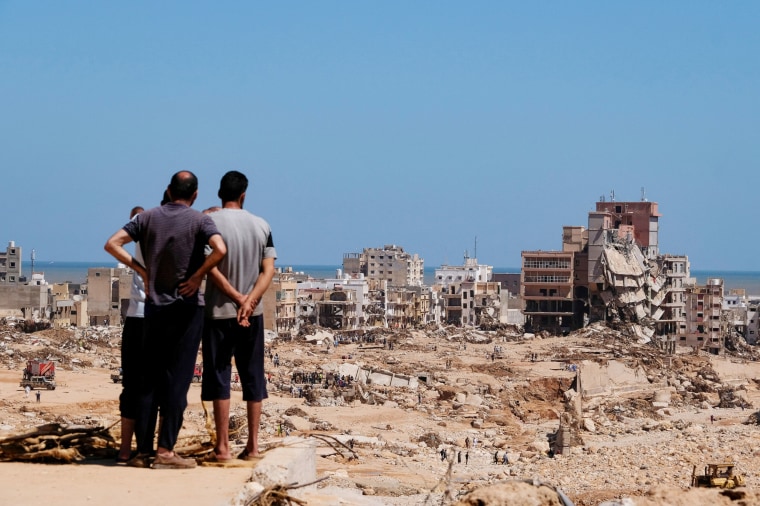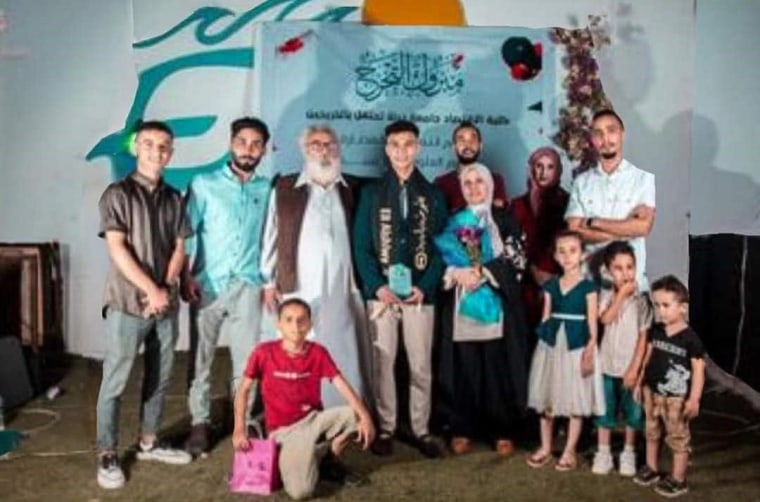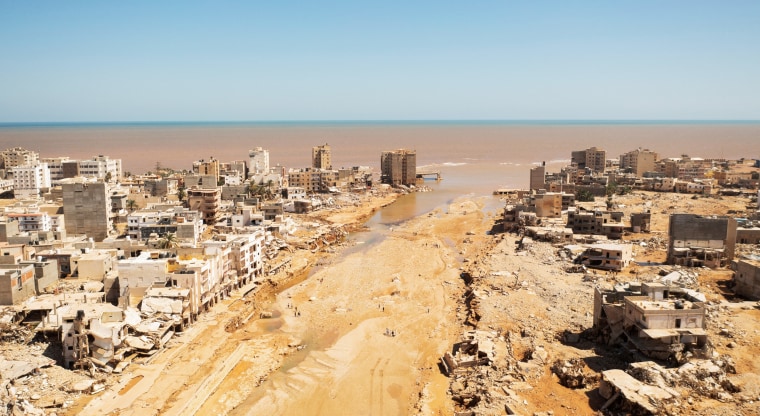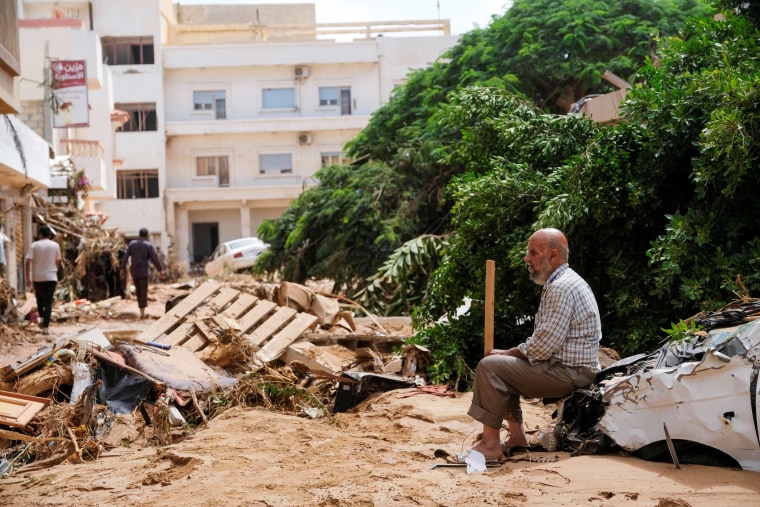Homes, lives and the heart of a city: The water ripped it all away.
Like so many others, construction worker Mohamad Mahmoud Ismail Al-Shalwi rushed home Monday morning to check on his extended family — but many were missing or dead.
“When I came, I found everything — my building, my family, the whole neighborhood — under the sea. Everything disappeared,” said Al-Shalwi, who is originally from Derna but lives in Benghazi, which acts as a capital for the eastern half of his divided country.
Al-Shalwi said that every minute that passes without knowing what has happened to his 12 missing family members, ages 3 months to 77 years, something inside him dies. “I can’t eat, I can’t sleep at all,” he said in a telephone interview.
You’re walking between bodies. You’re walking on bodies. Stepping on dead people.
Yousef Al-Shaari, a survivor
The storm that hit eastern Libya this week unleashed a wall of water that smashed into Derna when two dams burst, a natural disaster exacerbated by the chaotic and often crumbling state of the North African country after years of civil conflict left it ruled by two rival administrations.
Thousands of people have been killed in the coastal city, with thousands more missing as residents and those with family in the area are faced with the aftermath of the devastating deluge.
NBC News spoke to people on the ground in Derna who described scenes like nothing they have ever seen, or heard, before.

'Everything disappeared'
Discoveries have only brought heartbreak, Al-Shalwi said.
One of his brothers, a father of five, found the body of his 27-year-old wife and 18-month-old son in the sea 0.6 miles from the family home. They were found hugging each other close as the water lapped around them.
The rest of the children from that family are currently missing.
At least 11,300 people are so far confirmed to have died, according to the Libyan Red Crescent — a number many fear will rise in the hours and days ahead, as rescuers painstakingly search through rubble and seawater.

Derna’s mayor estimated Thursday that the floods may have killed as many as 20,000 out of the city’s population of 100,000.
Yet numbers and scenes beamed around the world on TV and social media are nothing in comparison to the reality, Al-Shalwi warned. The sea has taken the buildings, people, memories and history of an entire city.
“You are talking about total destruction. Nothing is there. It's like Hiroshima,” he said. “When I’m telling you [it’s] total destruction, I mean it. There’s nothing left.”
Al-Shalwi described how aid workers find bodies and take them to the local hospital, where anxious families are waiting.
"Every day I’m going to the hospital to see if there’s a body, or if someone survived, if they are a member of the family. I’m dying every moment. I have hope that maybe one of my family will survive," he said.

Adding to the agony is the hope that his loved ones might be found alive. He said he posted his family's pictures everywhere in the hope someone might recognize them.
Al-Shalwi has been told they are dead, while others say they are alive.
"All of this is just rumors, imagination. They want me to feel better, but this is killing me. No sign of life, no sign of death," he said.
"Maybe they ran away, maybe they are under the water, in the bottom of the sea."
'More like an earthquake'
From high up in the valley, the moment the dams burst sounded “more like an earthquake than an explosion.”
Soon the sounds were of shouting, and then of final prayers from people sheltering on rooftops in the dark of night, said Yousef Saleh Yousef Al-Shaari, 30, a civil servant who lives near one of the two ruined dams.
Their collapse sent floodwaters rushing down the riverbed that bisects Derna, reaching as high as 23 feet according to one estimate and quickly covering people's homes and businesses.
"You could see people on buildings with their phones lit up, shouting for help, but no one could do anything. And then suddenly one of the buildings would collapse and be washed away to the sea," Al-Shaari said.

When morning came he walked down into the valley, now a bloated river delta full of "apocalyptic" scenes of death and destruction.
"We went down and it was a disaster. You’re walking between bodies. You’re walking on bodies. Stepping on dead people. Just so we can get into buildings and pull out the survivors inside," he said.
"I’m a son of this city and know it inside out. But the first time I went down into town I didn’t know where I was. I couldn’t recognize the streets," Al-Shaari added.
He said 29 members of his extended family are missing. One was found dead, their body washed up 3 miles away.
Even in such despair, he found some hope for a nation divided by a decade of civil conflict that has seen two separate governments take control of opposite sides of the country.
"The one hope we have from this crisis in Derna is that it unites east and west Libya," Al-Shaari said.
But any reconciliation will come too late for Derna.
Most of the deaths from the floods could have been avoided if authorities had better warning systems and coordination in place, the United Nations’ weather and climate agency said Thursday.
One day before the storm hit Libya, the mayor said in a news conference that some areas surrounding the dam should be evacuated. But an emergency committee formed by the eastern government’s Interior Ministry ordered curfews instead.
A spokesperson for the mayor also said one of the city’s dams had not be maintained since 2008 because of Libya’s fractious politics.
So Al-Shaari was at home, at the top of the valley when the dams broke.
"I knew it was going to happen," he said. But few could have been prepared for what it unleashed.

